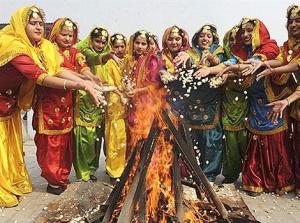 Lohri is essentially a festival dedicated to fire and the sun god. It is the time when the sun moves towards the north.
Lohri is essentially a festival dedicated to fire and the sun god. It is the time when the sun moves towards the north.When is Lohri celebrated?
According to the Bikram calendar, Lohri falls in the month of Paush i.e. around 13 January, as per the Gregorian calendar. It is, actually, celebrated a day before Makara Sankranti, as it marks the end of the winter season. Lohri is celebrated a day before Makar Sankranti. Makara Sankranti marks beginning of the solar Maagha masa, and Lohri must be celebrated on the last day of the solar Dhanur masa, which also marks the exit of the sun from Dhanu rashi (Sagittarius).
Legends behind the origin of Lohri
1. Loi - Kabir's wife
Some people believe that Lohri has derived its name from Loi, the wife of Saint Kabir.
2. Loh
There is a legend amongst some people that Lohri comes from the word 'loh', which means the light and the warmness of fire
3. Til and Reodi
Eating of til (sesame seeds) and rorhi is considered to be essential on Lohri day. Perhaps the words til and rorhi merged to become tilorhi, which eventually got shortened to Lohri
Connection between Lohri and Dulla Bhatti
The central character of most Lohri songs is Dulla Bhatti. He lived in Punjab during the reign of Mughal Emperor Akbar. He was regarded as a hero in Punjab. Besides robbing the rich, he rescued girls being forcibly taken to be sold in slave market of the Middle East from the Sandal Bar region. He arranged their marriages to boys of their religion with rituals and provided them with dowries. For such popular actions aimed at disbursing looted money amongst poor, he is also known as 'Robin Hood of Punjab'. So every other Lohri song has words to express gratitude to Dulla Bhatti.
Mythological Legend behind Lohri
Lohri and Holika were two sisters. It is said that Hiranyakayshapu ordered Holika to sit in the fire taking Prahlad in her lap along with Lohri. Prahlad escaped with Lohri whereas Holika perished in the fire.
Lohri Festival is celebrated with great pomp in North India. People gather around the bonfire and throw til, puffed rice & popcorns into the flames of the bonfire. Prayers are offered to the bonfire seeking abundance & prosperity.
In January, the fields come up with the promise of a golden harvest, and farmers celebrate Lohri during this rest period before the cutting and gathering of crops. Lohri is traditionally associated with the harvest of the rabi crops. The purpose of the Lohri harvest ceremony is to thank the God for his care and protection. throughout the day and night.
Wishing all of you a Happy Lohri :)
No comments:
Post a Comment